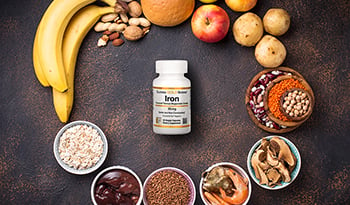6 Nutritional Deficiency Red Flags
DISCLAIMER:This blog does not intend to provide diagnosis...
- In this article:
- 1. Bone Pain And Backache
- 2. Low Exercise Tolerance And Fatigue
- 3. Chronic Dry Cough
- 4. Chapped Lips
- 5. Muscle Cramps
- 6. Hair Loss
- Key Takeaways

Knowing how to spot the signs and symptoms of vitamin and mineral deficiencies early can help prevent more serious health issues.
Let’s look at six common nutrient deficiency symptoms and discover how to maintain optimal levels of essential vitamins and minerals.
1. Bone Pain And Backache
Vitamin D plays a critical role in bone health, and research published in the Journal of Musculoskeletal Medicine suggests that vitamin D deficiency is a common cause of unexplained bone pain.
Vitamin D regulates intestinal calcium absorption, which is crucial to maintaining optimal bone mass. Lack of adequate vitamin D can significantly impair calcium absorption and is associated with calcium deficiency and poor bone mineral density.
Weakened bones can lead to bone pain that is often described as deep and achy and tends to predominantly affect the bones of the lower back, hips, legs, and ribs.
How to boost/replenish vitamin D
Vitamin D, also known as the sunshine vitamin, is produced when the skin is exposed to ultraviolet (UV) radiation in sunlight.
It’s estimated that almost half of U.S. adults are vitamin D deficient. Age, body weight, skin tone, and geographical location are all factors that can significantly impact vitamin D production.
While oily fish, beef liver, and egg yolks are dietary sources of vitamin D, these foods don’t contain enough vitamin D to promote optimal levels.
Evidence published in Frontiers in Nutrition found that taking vitamin D supplements is a highly effective strategy to manage and prevent deficiency while maintaining healthy vitamin D stores.
It’s generally recommended to take vitamin D3, which is significantly more potent than vitamin D2, a synthetic form of vitamin D typically used in fortified foods.
2. Low Exercise Tolerance And Fatigue
Low exercise tolerance and fatigue are common early warning signs of iron deficiency.
Iron is needed to produce hemoglobin, a protein in red blood cells that carries oxygen throughout the body, which is essential for energy production and normal cellular functioning.
Iron deficiency contributes to anemia, which can impair the body’s oxygenation processes, leading to fatigue and decreased exercise capacity.
While inadequate iron levels are often the underlying cause of fatigue, evidence published in Nutrients highlights various other nutrient deficiencies that can cause anemia.
In addition to iron, B vitamins, including folic acid and vitamin B12, are also crucial for red blood cell formation, and a vitamin B12 or folate deficiency can lead to common anemia symptoms, including poor exercise tolerance, weakness, pale skin, and hair loss.
How to boost/replenish iron
Consuming iron-rich foods such as organ meats, red meat, poultry, and certain types of fish in combination with vitamin C-containing foods can boost iron absorption and help prevent deficiency.
Maintaining healthy iron intake may be particularly beneficial for individuals at increased risk of iron deficiency, including pregnant women, individuals with irritable bowel syndrome or celiac disease, and those following vegetarian or vegan diets.
In some cases, iron supplements may be necessary to correct a deficiency, and it’s recommended to consult a healthcare provider for appropriate dosage recommendations and regular testing.
3. Chronic Dry Cough
Having a persistent and chronic dry cough without signs of a viral or bacterial infection can indicate calcium deficiency.
Calcium isn’t just vital for healthy bones. This essential mineral plays an important role in maintaining cardiovascular functions and helps regulate muscle contraction and relaxation.
Calcium deficiency can cause muscle cramps, spasms, and affect the muscles of the respiratory tract, which has been linked to chronic coughing.
How to boost/replenish calcium
Incorporating plenty of calcium-rich foods is essential for maintaining optimal calcium levels.
Here are some of the best dietary sources of calcium:
- Dairy products, such as yogurt and cheese
- Dark green vegetables, including kale, spinach, and collard greens
- Seeds and nuts
- Small fish with edible bones
A study published in PLOS ONE found that almost 60 percent of adults don’t meet their recommended daily allowance (RDA) for calcium and suggests that calcium supplements may be necessary to promote adequate calcium levels.
It’s recommended to ensure adequate stomach acidity and take calcium in combination with a vitamin D3 supplement to maximize intestinal calcium absorption.
4. Chapped Lips
Chapped and dry lips can be early warning signs of several nutritional deficiencies, including vitamin B, zinc, and omega-3 fatty acid deficiency.
Zinc and omega-3 fatty acids are crucial for healthy skin, especially the lips, and deficiencies can weaken the natural skin barrier, leading to dehydrated lips prone to irritation, redness, and chapping.
Chapped lips accompanied by cracked corners of the mouth can be an early warning sign of vitamin B deficiencies, especially vitamins B2 and B3.
According to research published in Cutis, these B vitamins help maintain skin cells and mucous membranes, and deficiencies can lead to inflamed and cracked lips.
How to boost/replenish zinc, essential fatty acids, and B vitamins
Because chapped lips can be linked to several nutrient deficiencies, it’s vital to focus on nutrient-rich whole foods while avoiding processed foods, which typically lack vitamins, minerals, and essential fatty acids.
It’s also recommended to increase the intake of zinc-rich foods such as oysters, seafood, meat, nuts, dairy, and eggs or consider taking a trace mineral supplement.
Cod liver oil, salmon, mackerel, oysters, chia seeds, flaxseeds, and walnuts are rich sources of omega-3 fats and can help manage and prevent dry lips.
Individuals with persistent dry lips may benefit from a comprehensive vitamin and mineral supplement to replenish nutrient stores and rejuvenate skin health.
5. Muscle Cramps
Muscle cramps are most commonly associated with magnesium deficiency, and a study published in Age and Aging found that almost 40 percent of the population suffers from frequent cramps and spasms.
Magnesium is an essential electrolyte that promotes muscle function and regulates the relaxation of muscle fibers, which explains why a lack of adequate magnesium can quickly lead to muscle cramps.
In addition to magnesium deficiencies, electrolyte imbalances, such as low potassium levels in combination with a high sodium intake, have also been linked to an increased risk of muscle spasms, nocturnal leg cramps, and insomnia.
How to boost/replenish electrolytes
Managing and preventing muscle cramps typically involves maintaining optimal magnesium stores and regularly replenishing electrolytes, including potassium, calcium, and chloride.
This has been validated by a recent study published in the Journal of Exercise and Nutrition investigating the effect of electrolyte replacement on muscle function. The authors concluded that a magnesium-rich electrolyte mix was highly effective in reducing mild to severe muscle cramps in athletes.
Electrolyte supplements are widely available and can replace electrolytes lost through sweating, urination, physical activity, or gastrointestinal issues.
Although there are many dietary sources of magnesium, including green leafy vegetables, nuts, seeds, salmon, and mackerel, most people don’t consume enough magnesium-rich foods to prevent deficiency.
Evidence consistently confirms that magnesium supplementation is safe and an effective strategy to promote healthy magnesium levels.
6. Hair Loss
Healthy hair requires several essential nutrients, and hair loss is a common symptom of various vitamin and mineral deficiencies.
Here are common nutrient deficiencies linked to hair thinning and hair loss:
- Vitamin D deficiency
- Biotin deficiency
- Trace minerals deficiency, including zinc, iron, copper, and selenium
- Essential fatty acids deficiency
These vitamins, minerals, and fatty acids play a critical role in regulating hair follicle cycling, maintaining a healthy scalp, and promoting the growth of strong and resilient hair shafts. Deficiencies in one or several of these nutrients can affect hair health and contribute to hair loss.
In addition, research published in Cureus found that some cases of hair loss are linked to poor thyroid function, which is often connected to moderate to severe iodine deficiency.
How to boost/replenish hair-health-promoting nutrients
The most effective way to restore hair health and prevent hair loss depends on the underlying cause.
However, taking vitamin D in combination with omega-3 fatty acids and choosing a hair-growth supplement, including biotin and trace minerals, can provide a targeted nutritional strategy to support scalp and hair health.
In addition, it's vital to consume a balanced diet rich in nutritious whole foods to promote the body’s overall nutrient stores and prevent nutritional deficiencies linked to hair loss.
Key Takeaways
- Recognizing common nutritional deficiency symptoms early helps make beneficial changes possible and may prevent health issues from worsening.
- Signs such as hair loss, muscle cramps, chapped lips, fatigue, bone pain, or a persistent dry cough are red flags indicating potential nutrient deficiencies.
- Maintaining a balanced diet in combination with targeted supplementation is an excellent strategy to replenish the body’s nutrient stores and promote health and well-being.
References:
- https://www.ncbi.nlm.nih.gov/pmc/articles/PMC3188408/#
- https://www.frontiersin.org/articles/10.3389/fnut.2023.1168115/full
- https://journals.plos.org/plosone/article?id=10.1371/journal.pone.0235042 \
- https://cdn.mdedge.com/files/s3fs-public/Document/September-2017/088010027.pdf
- https://academic.oup.com/ageing/article-abstract/23/5/418/26543?redirectedFrom=full text
- https://journalofexerciseandnutrition.com/index.php/JEN/article/view/126
- https://www.sciencedirect.com/science/article/pii/S2161831323013352
- https://www.ncbi.nlm.nih.gov/pmc/articles/PMC10492440/
- https://www.drberg.com/blog/the-best-tip-for-a-chronic-dry-cough
- https://www.drberg.com/blog/leg-cramps-at-night-or-nocturnal-cramps

 By Dr. Eric Berg, D.C.
By Dr. Eric Berg, D.C.


